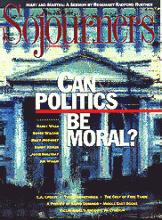During our August 1991 20th anniversary festival, I held several discussions with magazine readers about the future of Sojourners. We were in Grand Rapids, Michigan, but the participants had come from all over North America. At the first session, about 50 people voiced their needs and concerns. One of the first comments made was from someone who stood up and said, "I am from Waterloo, Ontario, and I really want to meet other Sojourner people in my area." At that, another person across the room jumped up to say, "Hey, I'm from Waterloo too, and I feel the same need." They had never met before, but were soon off in the corner talking.
The need to make connection with "other sojourners" became the theme of those discussions. In a rising tide of voices, I've since heard that same need expressed over and over as I travel around the country. After a great day this week with students and faculty at Central Baptist Seminary in Kansas City, the same question emerged, as it always does now, "How can we get together, and where do we go from here."
People who read the magazine or respond to our speaking on the road consistently tell us that they want to meet others who share a kindred spirit in their own communities and to feel connected to diverse people seeking a common vision in other parts of the country and the world. They regularly challenge Sojourners to help make that more possible.
We're getting the message.
Our "Connections" page in the magazine has been a free space for that to happen for some time now. From the brief ads placed there, people have found one another, jobs have been filled, support groups have formed, new communities and projects have been established, and, I'm told, some marriages have even come about! Obviously, connections are being made. But we've been consistently told that more is necessary.
Read the Full Article

